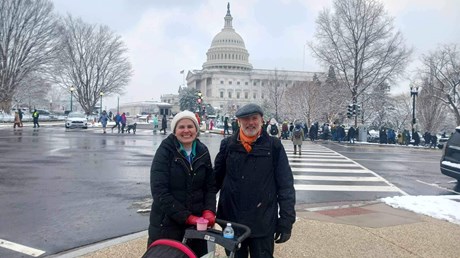Search Results for Evangelicals
Articles
What The Bible Says Good Samaritan's Penny Pulpit by Pastor Ed Rice
|
What The Bible Says Good Samaritan's Penny Pulpit by Pastor Ed Rice
|
What The Bible Says Good Samaritan's Penny Pulpit by Pastor Ed Rice
|
What The Bible Says Good Samaritan's Penny Pulpit by Pastor Ed Rice
|
What The Bible Says Good Samaritan's Penny Pulpit by Pastor Ed Rice
|
News
We must always be people of the Word, but we'll have to reimagine deep engagement with Scripture.
 Christians are readers. We are “people of the book.” We own personal Bibles, translated into our mother tongues, and read them daily. Picture “quiet time” and you’ll see a table, a cup of coffee, and a Bible spread open to dog-eared, highlighted, annotated pages. For Christians, daily Bible reading is the minimum standard for the life of faith. What kind of Christian, some of us may think, doesn’t meet this low bar?This vision of our faith resonates for many. It certainly describes the way I was raised. As a snapshot of a slice of the church at a certain time in history—20th-century American evangelicals—it checks out. But as a timeless vision of what it means to follow Christ, it falls short, and it does so in a way that will seriously impinge on our ability to make disciples in an increasingly postliterate culture, a culture in which most people still understand the bare mechanics of reading but overwhelmingly consume audio and visual media instead.We can see how this literacy-focused idea of Christianity will fail in the future by looking to the past. For most of Christian history, most believers were illiterate. Reading the Bible daily wasn’t an option because reading wasn’t an option.This doesn’t mean Scripture was irrelevant to ordinary Christians’ lives. But the sacred page wasn’t primarily a private matter for personal devotion; it was a public matter heard in the gathering of God’s people for worship. The Bible was the church’s book—a liturgical book, a book whose natural habitat was the voice of Christ’s body lifted in praise. To hear the Word of God, you joined the people of God. Lectors ...Continue reading... Christians are readers. We are “people of the book.” We own personal Bibles, translated into our mother tongues, and read them daily. Picture “quiet time” and you’ll see a table, a cup of coffee, and a Bible spread open to dog-eared, highlighted, annotated pages. For Christians, daily Bible reading is the minimum standard for the life of faith. What kind of Christian, some of us may think, doesn’t meet this low bar?This vision of our faith resonates for many. It certainly describes the way I was raised. As a snapshot of a slice of the church at a certain time in history—20th-century American evangelicals—it checks out. But as a timeless vision of what it means to follow Christ, it falls short, and it does so in a way that will seriously impinge on our ability to make disciples in an increasingly postliterate culture, a culture in which most people still understand the bare mechanics of reading but overwhelmingly consume audio and visual media instead.We can see how this literacy-focused idea of Christianity will fail in the future by looking to the past. For most of Christian history, most believers were illiterate. Reading the Bible daily wasn’t an option because reading wasn’t an option.This doesn’t mean Scripture was irrelevant to ordinary Christians’ lives. But the sacred page wasn’t primarily a private matter for personal devotion; it was a public matter heard in the gathering of God’s people for worship. The Bible was the church’s book—a liturgical book, a book whose natural habitat was the voice of Christ’s body lifted in praise. To hear the Word of God, you joined the people of God. Lectors ...Continue reading... |
Leader explains why the movement is seeing its biggest membership bump in 30 years and its mission for the years ahead.
 As CEO of the United Kingdom’s Evangelical Alliance (EA), Gavin Calver sometimes compares the organization to the polarizing British breakfast spread Marmite: You either love it or you hate it.The EA hears plenty from its critics, taking hits for stances on issues like transgender identity, and is calling on Christians who love them from a distance to actually join.“We’re asking, ‘Will you please stand with us as someone who loves Marmite, not dislikes it?’” Calver said. “In our culture, it makes it a little lighthearted, but it needs very little explaining. People get it quickly.”More churches, organizations, and individuals are responding to the call, and after record growth in the past year year, the tally of dues-paying individual members recently topped 23,000. The total is a signal of the group’s influence to government officials and societal leaders, allowing the EA to represent evangelicals more effectively in the wider culture.Many of the new individual members signed up when EA representatives spoke at member churches, so much of the recent growth “reflects the constituency we already have,” according to Calver. Still, the EA’s membership is becoming more ethnically diverse and trending younger, he said, with most of its growth happening “beyond the southeast of England where we were strongest to start with.”Calver recently spoke to CT about his vision for the EA, why so many new members are signing up now, and how evangelicals in the UK are staying united despite their differences.This interview has been edited for length and clarity.Continue reading... As CEO of the United Kingdom’s Evangelical Alliance (EA), Gavin Calver sometimes compares the organization to the polarizing British breakfast spread Marmite: You either love it or you hate it.The EA hears plenty from its critics, taking hits for stances on issues like transgender identity, and is calling on Christians who love them from a distance to actually join.“We’re asking, ‘Will you please stand with us as someone who loves Marmite, not dislikes it?’” Calver said. “In our culture, it makes it a little lighthearted, but it needs very little explaining. People get it quickly.”More churches, organizations, and individuals are responding to the call, and after record growth in the past year year, the tally of dues-paying individual members recently topped 23,000. The total is a signal of the group’s influence to government officials and societal leaders, allowing the EA to represent evangelicals more effectively in the wider culture.Many of the new individual members signed up when EA representatives spoke at member churches, so much of the recent growth “reflects the constituency we already have,” according to Calver. Still, the EA’s membership is becoming more ethnically diverse and trending younger, he said, with most of its growth happening “beyond the southeast of England where we were strongest to start with.”Calver recently spoke to CT about his vision for the EA, why so many new members are signing up now, and how evangelicals in the UK are staying united despite their differences.This interview has been edited for length and clarity.Continue reading... |
The American Solidarity Party is a small but growing alternative to the Trump-Biden race.
 Charlie Richert would really like to stop voting for his dad.But in the last couple presidential election cycles, the 30-year-old attorney in Indianapolis has been unable to square his conscience with picking either the Republican or Democratic party nominee, so he’s resorted to writing in a name.“There’s no way I can escape having my faith inform how I vote,” said Richert, a nondenominational Christian who grew up Republican. “Unfortunately, we’ve been kind of stuck in a doom loop of candidates at the presidential level that I’ve just not felt comfortable voting for.”This year, he’s not drawn to alternatives like Robert F. Kennedy Jr. or Cornel West. “Maybe I’ll write in Abe Lincoln this year. Sorry to my dad, but a new name to write in would be fun,” he said.He recalls seeking to convince his classmates in an eighth-grade mock election that they should support Mitt Romney, but his chagrin with the Republican Party’s presidential nominee tracked with the ascension of Donald Trump.In a year when both major party presidential candidates are viewed unfavorably by a quarter of Americans, many find themselves less excited about the two options at the top of the ticket. But, like Richert, that doesn’t mean they’re ready to go for third-party options.The third-party candidates running in 2024 span the ideological spectrum, from independents Kennedy and Princeton University professor Cornel West to Green Party candidate Jill Stein. Then there are the more obscure party or candidate options—the Prohibition Party, Andrew Yang’s Forward Party, Maryland politician Jason Palmer, and that man in Texas who changed his name to “Literally ...Continue reading... Charlie Richert would really like to stop voting for his dad.But in the last couple presidential election cycles, the 30-year-old attorney in Indianapolis has been unable to square his conscience with picking either the Republican or Democratic party nominee, so he’s resorted to writing in a name.“There’s no way I can escape having my faith inform how I vote,” said Richert, a nondenominational Christian who grew up Republican. “Unfortunately, we’ve been kind of stuck in a doom loop of candidates at the presidential level that I’ve just not felt comfortable voting for.”This year, he’s not drawn to alternatives like Robert F. Kennedy Jr. or Cornel West. “Maybe I’ll write in Abe Lincoln this year. Sorry to my dad, but a new name to write in would be fun,” he said.He recalls seeking to convince his classmates in an eighth-grade mock election that they should support Mitt Romney, but his chagrin with the Republican Party’s presidential nominee tracked with the ascension of Donald Trump.In a year when both major party presidential candidates are viewed unfavorably by a quarter of Americans, many find themselves less excited about the two options at the top of the ticket. But, like Richert, that doesn’t mean they’re ready to go for third-party options.The third-party candidates running in 2024 span the ideological spectrum, from independents Kennedy and Princeton University professor Cornel West to Green Party candidate Jill Stein. Then there are the more obscure party or candidate options—the Prohibition Party, Andrew Yang’s Forward Party, Maryland politician Jason Palmer, and that man in Texas who changed his name to “Literally ...Continue reading... |
The American Solidarity Party is a small but growing alternative to the Trump-Biden race.
 Charlie Richert would really like to stop voting for his dad.But in the last couple presidential election cycles, the 30-year-old attorney in Indianapolis has been unable to square his conscience with picking either the Republican or Democratic party nominee, so he’s resorted to writing in a name.“There’s no way I can escape having my faith inform how I vote,” said Richert, a nondenominational Christian who grew up Republican. “Unfortunately, we’ve been kind of stuck in a doom loop of candidates at the presidential level that I’ve just not felt comfortable voting for.”This year, he’s not drawn to alternatives like Robert F. Kennedy Jr. or Cornel West. “Maybe I’ll write in Abe Lincoln this year. Sorry to my dad, but a new name to write in would be fun,” he said.He recalls seeking to convince his classmates in an eighth-grade mock election that they should support Mitt Romney, but his chagrin with the Republican Party’s presidential nominee tracked with the ascension of Donald Trump.In a year when both major party presidential candidates are viewed unfavorably by a quarter of Americans, many find themselves less excited about the two options at the top of the ticket. But, like Richert, that doesn’t mean they’re ready to go for third-party options.The third-party candidates running in 2024 span the ideological spectrum, from independents Kennedy and Princeton University professor Cornel West to Green Party candidate Jill Stein. Then there are the more obscure party or candidate options—the Prohibition Party, Andrew Yang’s Forward Party, Maryland politician Jason Palmer, and that man in Texas who changed his name to “Literally ...Continue reading... Charlie Richert would really like to stop voting for his dad.But in the last couple presidential election cycles, the 30-year-old attorney in Indianapolis has been unable to square his conscience with picking either the Republican or Democratic party nominee, so he’s resorted to writing in a name.“There’s no way I can escape having my faith inform how I vote,” said Richert, a nondenominational Christian who grew up Republican. “Unfortunately, we’ve been kind of stuck in a doom loop of candidates at the presidential level that I’ve just not felt comfortable voting for.”This year, he’s not drawn to alternatives like Robert F. Kennedy Jr. or Cornel West. “Maybe I’ll write in Abe Lincoln this year. Sorry to my dad, but a new name to write in would be fun,” he said.He recalls seeking to convince his classmates in an eighth-grade mock election that they should support Mitt Romney, but his chagrin with the Republican Party’s presidential nominee tracked with the ascension of Donald Trump.In a year when both major party presidential candidates are viewed unfavorably by a quarter of Americans, many find themselves less excited about the two options at the top of the ticket. But, like Richert, that doesn’t mean they’re ready to go for third-party options.The third-party candidates running in 2024 span the ideological spectrum, from independents Kennedy and Princeton University professor Cornel West to Green Party candidate Jill Stein. Then there are the more obscure party or candidate options—the Prohibition Party, Andrew Yang’s Forward Party, Maryland politician Jason Palmer, and that man in Texas who changed his name to “Literally ...Continue reading... |
The American Solidarity Party is a small but growing alternative to the Trump-Biden race.
 Charlie Richert would really like to stop voting for his dad.But in the last couple presidential election cycles, the 30-year-old attorney in Indianapolis has been unable to square his conscience with picking either the Republican or Democratic party nominee, so he’s resorted to writing in a name.“There’s no way I can escape having my faith inform how I vote,” said Richert, a nondenominational Christian who grew up Republican. “Unfortunately, we’ve been kind of stuck in a doom loop of candidates at the presidential level that I’ve just not felt comfortable voting for.”This year, he’s not drawn to alternatives like Robert F. Kennedy Jr. or Cornel West. “Maybe I’ll write in Abe Lincoln this year. Sorry to my dad, but a new name to write in would be fun,” he said.He recalls seeking to convince his classmates in an eighth-grade mock election that they should support Mitt Romney, but his chagrin with the Republican Party’s presidential nominee tracked with the ascension of Donald Trump.In a year when both major party presidential candidates are viewed unfavorably by a quarter of Americans, many find themselves less excited about the two options at the top of the ticket. But, like Richert, that doesn’t mean they’re ready to go for third-party options.The third-party candidates running in 2024 span the ideological spectrum, from independents Kennedy and Princeton University professor Cornel West to Green Party candidate Jill Stein. Then there are the more obscure party or candidate options—the Prohibition Party, Andrew Yang’s Forward Party, Maryland politician Jason Palmer, and that man in Texas who changed his name to “Literally ...Continue reading... Charlie Richert would really like to stop voting for his dad.But in the last couple presidential election cycles, the 30-year-old attorney in Indianapolis has been unable to square his conscience with picking either the Republican or Democratic party nominee, so he’s resorted to writing in a name.“There’s no way I can escape having my faith inform how I vote,” said Richert, a nondenominational Christian who grew up Republican. “Unfortunately, we’ve been kind of stuck in a doom loop of candidates at the presidential level that I’ve just not felt comfortable voting for.”This year, he’s not drawn to alternatives like Robert F. Kennedy Jr. or Cornel West. “Maybe I’ll write in Abe Lincoln this year. Sorry to my dad, but a new name to write in would be fun,” he said.He recalls seeking to convince his classmates in an eighth-grade mock election that they should support Mitt Romney, but his chagrin with the Republican Party’s presidential nominee tracked with the ascension of Donald Trump.In a year when both major party presidential candidates are viewed unfavorably by a quarter of Americans, many find themselves less excited about the two options at the top of the ticket. But, like Richert, that doesn’t mean they’re ready to go for third-party options.The third-party candidates running in 2024 span the ideological spectrum, from independents Kennedy and Princeton University professor Cornel West to Green Party candidate Jill Stein. Then there are the more obscure party or candidate options—the Prohibition Party, Andrew Yang’s Forward Party, Maryland politician Jason Palmer, and that man in Texas who changed his name to “Literally ...Continue reading... |



 Links
Links  Articles
Articles  Blogs
Blogs  Videos
Videos  News
News  Colors
Colors 

 New links
New links

